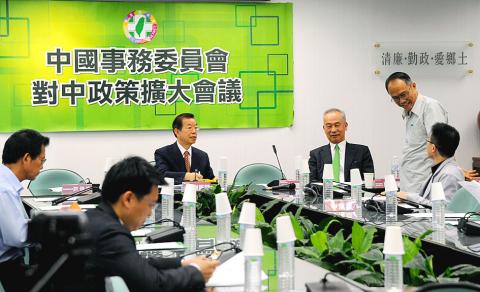The Democratic Progressive Party’s (DPP) discussion of its Taiwan independence policy again ended without a consensus yesterday, but participants agreed that the party should engage Beijing and establish an inter-party “constitutional consensus,” before forging closer ties with China.
“Participants agreed that cross-strait exchanges should not be monopolized by any party and the DPP should engage China with confidence. The party needs to fine-tune its policy to win the support of more voters and to resolve the ‘imbalance’ phenomenon,” said former premier Frank Hsieh (謝長廷), convener of an enlarged meeting of the DPP’s China Affairs Committee (CAC).
“The third consensus [of the meeting] was that the DPP should promote constitutionalism in Taiwan and make constitutional consensus [between political parties] the foundation of cross-strait dialogue,” he added.

Photo: CNA
Hsieh denied that the issue of eliminating the party’s Taiwan independence chapter, which has existed since 1991, was discussed at the meeting. However, participants mentioned the formulation of a new resolution, which supposedly would “replace” the previous resolution.
The DPP’s position on Taiwan’s national status has been largely defined by its party charter, which mentions the establishment of the Republic of Taiwan, and its resolution on Taiwan’s future of 1999, which defines Taiwan as a sovereign country separate from China, while acknowledging the Republic of China (ROC) as the nation’s formal title.
However, several DPP members argued that the position is why Beijing has refused to engage in dialogue with the party and that the policy would have to be adjusted so that people would have confidence in the DPP’s ability to manage cross-strait relations.
Tung Cheng-yuan (童振源), a professor at National Chengchi University who previously served as deputy minister of the Mainland Affairs Council, proposed that the party enact an “ROC resolution” which pledges that it would no longer attempt to change the nation’s formal title and establish a Republic of Taiwan.
The fundamental problem does not lie in the Taiwan independence policy, but in the party’s resolution on normalization of the country in 2007, which denounced the legality of the ROC government, former DPP chairman Hsu Hsin-liang (許信良) said after the meeting.
Several participants did mention the formulation of a new resolution for the DPP to better manage future cross-strait relations at the meeting, Hsu said.
“I don’t think the elimination of a past resolution would be meaningful. The problem is whether you can come up with a new resolution as the party’s guidance for the future,” Hsu said.

CHANGING LANDSCAPE: Many of the part-time programs for educators were no longer needed, as many teachers obtain a graduate degree before joining the workforce, experts said Taiwanese universities this year canceled 86 programs, Ministry of Education data showed, with educators attributing the closures to the nation’s low birthrate as well as shifting trends. Fifty-three of the shuttered programs were part-time postgraduate degree programs, about 62 percent of the total, the most in the past five years, the data showed. National Taiwan Normal University (NTNU) discontinued the most part-time master’s programs, at 16: chemistry, life science, earth science, physics, fine arts, music, special education, health promotion and health education, educational psychology and counseling, education, design, Chinese as a second language, library and information sciences, mechatronics engineering, history, physical education

The High Prosecutors’ Office yesterday withdrew an appeal against the acquittal of a former bank manager 22 years after his death, marking Taiwan’s first instance of prosecutors rendering posthumous justice to a wrongfully convicted defendant. Chu Ching-en (諸慶恩) — formerly a manager at the Taipei branch of BNP Paribas — was in 1999 accused by Weng Mao-chung (翁茂鍾), then-president of Chia Her Industrial Co, of forging a request for a fixed deposit of US$10 million by I-Hwa Industrial Co, a subsidiary of Chia Her, which was used as collateral. Chu was ruled not guilty in the first trial, but was found guilty

DEADLOCK: As the commission is unable to forum a quorum to review license renewal applications, the channel operators are not at fault and can air past their license date The National Communications Commission (NCC) yesterday said that the Public Television Service (PTS) and 36 other television and radio broadcasters could continue airing, despite the commission’s inability to meet a quorum to review their license renewal applications. The licenses of PTS and the other channels are set to expire between this month and June. The National Communications Commission Organization Act (國家通訊傳播委員會組織法) stipulates that the commission must meet the mandated quorum of four to hold a valid meeting. The seven-member commission currently has only three commissioners. “We have informed the channel operators of the progress we have made in reviewing their license renewal applications, and

Taiwan-based publisher Li Yanhe (李延賀) has been sentenced to three years in prison, fined 50,000 yuan (US$6,890) in personal assets and deprived political rights for one year for “inciting secession” in China, China's Taiwan Affairs Office spokesman Chen Binhua (陳斌華) said today. The Shanghai First Intermediate People’s Court announced the verdict on Feb. 17, Chen said. The trial was conducted lawfully, and in an open and fair manner, he said, adding that the verdict has since come into legal effect. The defendant reportedly admitted guilt and would appeal within the statutory appeal period, he said, adding that the defendant and his family have